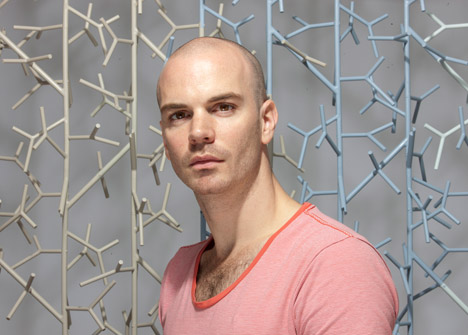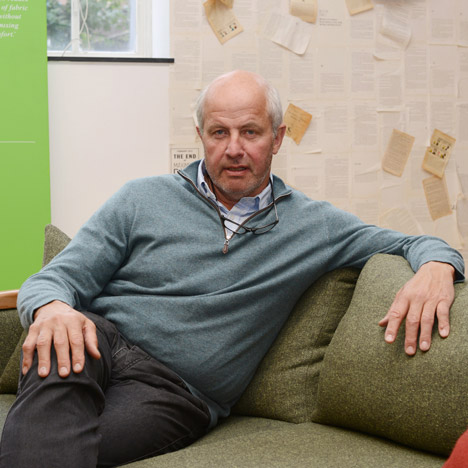News: Will Hobhouse of high-street furniture retailer Heal's has berated design schools for failing to teach business principles, claiming there's "no better background than an education through eBay" for designers who want to learn how to make a living.
"We've worked with a lot of younger designers who come out of college," said Hobhouse, chairman of British retail brand Heal's during a talk titled Redesigning the Design Industry. "I think a lot of the colleges are catastrophic at the business part of any course."
Hobhouse suggested that without dedicated business classes at design school, young designers should learn how to sell their products practically using retail and auction website eBay.
"For designers, the really tricky thing is making a living," said Hobhouse. "I know this sounds ridiculous but in our context, most people don't last long in retail unless they grubbily want to sell stuff. All of us really sell stuff and there's no better background than an education through eBay probably."
"Really, eBay is the most fantastic learning ground for buying something for a pound and selling it for two. What better way to learn?"
Hobhouse featured on a panel during last month's London Design Festival that included chairman of online design marketplace Clippings.com David Begg, and designers Benjamin Hubert and Pia Wüstenberg, chaired by journalist Rose Etherington.

Begg, who co-founded designer Tom Dixon's eponymous brand in 2002, agreed that institutions do not do enough to prepare their students for the world of business.
"One of the problems I think for designers coming out of design schools is they're often launched out in to the world, told go off and become a designer on your own," he said.
"A lot want to produce on their own and control the output and that creativity, but there's very little education within design schools on what it means to run a business, and to build your design into a design business."
Begg suggested that designers collaborate with those trained in the business side of retail in order to achieve the best results.
Hubert, who set up his own brand not long after graduating, also spoke about the compromise designers are being forced to make to become successful in the current environment.
"At my heart I'm a designer and when you start production... it's hugely time-consuming and you take a step back from designing, then you sort of become an organiser of logistics," he said.
"I've taken the decision in many ways to play to the strengths of myself and the studio and move more towards really delivering high-quality experiences and performance from products rather than building a brand of self-production, or production of any type."
The talk was organised by Clippings.com and took place at the designjunction exhibition at The Sorting Office, New Oxford Street.
Read an edited version of the transcript from the talk below:
Rose Etherington: What are the challenges facing emerging designers setting up their own businesses?
Benjamin Hubert: At my heart I'm a designer and when you start production as many people here will say, it's hugely time-consuming and you take a step back from designing, then you sort of become an organiser of logistics.
So I've taken the decision in many ways to play to the strengths of myself and the studio and move more towards really delivering high-quality experiences and performance from products rather than building a brand of self-production, or production of any type.
Rose Etherington: How can designers spend less time managing their businesses and more time doing what they're best at?
David Begg: One of the problems I think for designers coming out of design schools is they're often launched out in to the world - told go off and become a designer on your own.
A lot want to produce on their own and control the output and that creativity, but there's very little education within design schools on what it means to run a business, and to build your design into a design business.
A lot of the time you are on your own doing it as a one-man-band and any business knows that to do it well you will need a different set of skills to deal with certain parts of it.
Scaling up can be very difficult, which is why I'm a firm believer that where one can apply technology to assist in some of those things – packages which are online and much easier to use and you can use them on your mobile – suddenly you're free from those things because you can be doing those things on the fly.
So a lot of these things are great enablers. But there's still part of education, which is necessary to get people up to the stage where they can run a business if they want to. If someone wants to run a design business, it's ultimately a business and that's a struggle.
Will Hobhouse: For designers, the really tricky thing is making a living. I know this sounds ridiculous but in our context, most people don't last long in retail unless they grubbily want to sell stuff. All of us really sell stuff and there's no better background than an education through eBay probably. You then get the question of design and particularly perfectionism in design. It is really tricky because if you want to follow your dream and design exactly what you are passionate about in the way you want it, you are less likely to sell it.
The only way in my experience this thing works is if you are in partnership with at least one other person, preferably two others. So collectives are fantastic because it means that somebody can be passionate about design and go off into a zone of perfectionism and meanwhile there's a support group of other people who are better at selling things, better at running a studio, better at paying the bills, all that stuff.
So two or three people together is much more powerful than one working on their own. I think working on your own is unbelievably lonely as well. So working as a partnership to me in whatever way it is - doesn't have to be formal - is the real way forward.
David Begg: Ultimately it's about having different skill sets. If you've got three people who want to be designers rather than be accountants and salesmen, you've got a problem.
Apart from Tom [Dixon] being an extraordinary designer, the partnership between Tom and I was what enabled us to build what is now a substantial size company because it was that melding of design and business in equal parts because we were equal shareholders from the start in the business.
I wasn't trying to be a designer and never would try, but was able to put the infrastructure in place and get out there and sell and do all those things, which most designers may actually be very good at but they don't necessarily want to be doing them.
Pia Wüstenberg: I agree in many ways with what you're saying - everyone is an expert in an area so either you're an expert in design or you're an expert in business or you're an expert in selling. I agree also that designers should not shy away from asking for help in business, because that's what other people are good at and what they do all the time.
On the other hand, I don't really believe in the designer as a recluse in his studio designing for this world. I think you need to be confronting this world, interacting with the people you're selling to and working with. It doesn't work if you completely withdraw yourself from it.
Design is a very egoistic, selfish area. You have a vision and you think it's what everyone should like or buy or be, but I think that's not really what we need any more.
Today the job of the designer is a lot broader and it goes back to doing manufacturing that's right for the people that are making your products to be happy, to be doing it well and enjoying it.
As a designer you have this control. You choose where you want to manufacture, how you want to manufacture, how many people you want to work on it... you really can choose where you sell and I think that's a strength you have. And you shouldn't give it all away. As much as you should work with experts and work with other people as a designer you should also be involved in most aspects your product reaches or who your product reaches.
Rose Etherington: Where can designers learn how to approach business then, if not in design school?
Will Hobhouse: eBay! Really, eBay is the most fantastic learning ground for buying something for a pound and selling it for two. What better way to learn?
In my limited experience we've worked with a lot of younger designers who come out of college. I think a lot of the colleges are catastrophic at the business part of any course.
My own view is people have to decide if they want to make a living. If they want to make a living they need to look at where their designs are going to end up and what those people really want, without ruining one's own aesthetic.
I know this is going to sound rather pathetic but I think you have to remember your customer all the time. If I'm doing this great thing, whatever I'm designing for, if it's going to end up in someone's home, it's quite useful to know how those people might live their lives.
I think that designing without some thought given to that is sort of a bit silly, unless you are very happy to be in a studio not earning a high living. I think the people who are very clever do probably very grubby stuff, and I apologise for the grubbiness of it, but actually combining design with thought about the use and the customer is much more powerful.
Ikea is astonishing at creating great design in vast volumes done incredibly well. And actually one forgets Ikea to one's peril.

